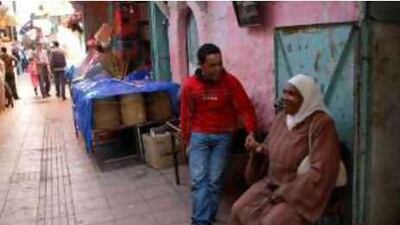RABAT // On a slow afternoon in a downtown cafe, two generations of Moroccans are talking about the future of talking. "When I visited Egypt, I could hardly make myself understood," said Samira Elamchit, 42, the cafe owner. "You could learn to speak other dialects," replied Naziha el Adily, 24, a waitress. "Just turn on the TV." Like most Moroccans, both these women are already polyglot, adept at French and different forms of Arabic. Uniting them is Morocco's colloquial speech, an ever-changing stew of Arabic, Berber, French and Spanish whose nearly vowel-free clickity-clack famously baffles even other Arabic-speakers. Long disdained by Morocco's leaders, Moroccan dialect is now asserting itself - even as it drifts closer to standard Arabic.
Moroccan Arabic, called simply Derija, or "dialect", by its 30 million speakers, has evolved considerably since Arab armies swept into Morocco in the seventh century, bringing their religion and language. Berber dialects have lent words and cadence, while 20th-century European colonialism injected French and Spanish terms. Like other Arab kings, Morocco's Mohammed VI is al malek. But Moroccan princesses carry the title lalla, Berber for "my lady".
Ask a Moroccan if he speaks Arabic, and he may well respond, "La, wlakn ana knhdr lderija mzien!" - "No, but I speak Derija fluently!" At the height of pan-Arabism during the 1960s and 1970s, Morocco's leaders made standard Arabic the country's official language, promoting it as the vehicle of religion and culture, and forbidding Derija use in classrooms. Critics say this helped keep just a little less than half of Moroccans illiterate, since they had to learn a new language in order to read.
But now Derija is rising as the voice of ordinary Moroccans - direct, funny and in tune with the Moroccan soul. While official discourse and the nightly news are still in Arabic, Derija is the language of Moroccan cinema, pop music and advertising, and has begun forays into literature and print media. The weekly magazine Nichane, whose title means "straight" in Derija, is Morocco's foremost publication showcasing written Derija.
"As a familiar language, Derija doesn't have a politically correct side," said Abdel Illah Salhi, the editor of Nichane. "To put Derija into the magazine is like adding a pinch of salt." Nichane's house style is a refined blend of Derija and standard Arabic aimed at an educated audience. "We've had to adapt Derija to certain professional standards," Mr Salhi said. "People call Derija vulgar - we try with every issue of Nichane to show the contrary."
Since launching in 2006, Nichane has become Morocco's number one Arabic-language weekly, said Ahmed Benchemsi, its publisher. But the magazine's linguistic bluntness and penchant for hammering at Moroccan taboos have landed it in trouble. Last year, the courts barred Nichane from publishing for two months, and fined its then-editor and a journalist US$9,700 (Dh36,000) collectively for running an article on traditional jokes about Islam.
Also last year, Mr Benchemsi was charged with insulting the monarchy after he wrote an editorial questioning a speech by King Mohamed VI. He believes his crime was not merely what he said, but that he said it in Derija. Morocco's political establishment remains wary of the country's native tongue. The governing Istiqlal party has long promoted "arabisation" as part of a broader nationalist platform. The Islamist opposition Justice and Development Party, or PJD, considers standard Arabic the proper language for an Arab Muslim people.
"Derija isn't really a language," said Mustapha Ramid, who heads the PJD's parliamentary group. "Arabic is the language of religion and the Arab world, with whom we must maintain ties." Derija's supporters argue that the dialect is part of Morocco's identity. "Some people say we should speak pure Arabic," Mr Benchemsi said. "I don't want to be pure - I want to be Moroccan." The potent cocktail of youth and technology are driving a renaissance in Derija. Many new phrases are attributed to rappers from Casablanca's vast suburbs, and online chat forums buzz with Derija written in the Latin alphabet.
But as education improves and illiteracy rates fall, young Moroccans' everyday speech is moving closer to standard Arabic, said linguist Moncef Lahlou, the director of the Language Center at Morocco's Al Akhawayn University. Moroccans raised on Middle Eastern films and pop stars are already able to speak passable Levantine dialects of Arabic, which are close to standard Arabic. The Turkish television series Nour, which has swept across the Arab world, has created a vogue in Morocco for the Syrian dialect in which it is dubbed.
"Eastern accents even sound beautiful when people argue," said Naziha El Adily, the Rabat waitress. "When they call someone a donkey, they draw the word out - hamaar." Derija, laden with guttural explosions, sounds rough by comparison. But Ms Adily said this is what makes it special. "Derija is specific to Morocco," she said. "I don't expect others to be able to speak it, and I'm proud to be able to speak other dialects."
And if she picks up some Eastern-isms? "Every generation will add new words, but Derija will remain Derija." jthorne@thenational.ae

